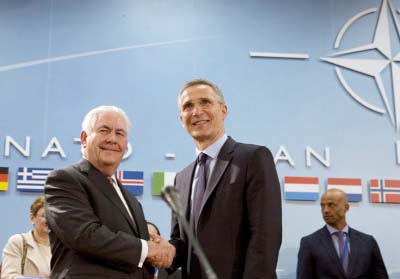
AP, Brussels :
US Secretary of State Rex Tillerson warned NATO allies Friday to boost defense spending or come up with plans to reach the alliance’s budget guidelines within two months.
Tillerson, in his first talks with NATO counterparts in Brussels, said that Washington is spending a “disproportionate share” on defense compared with its 27 partners, and that he expects action by the time President Donald Trump meets with other alliance leaders on May 25.
NATO leaders pledged in 2014 to halt defense spending cuts and move toward a guideline target of 2 percent of gross domestic product within a decade. Only four other nations currently meet the target: Britain, Estonia, Greece and Poland.
“Our goal should be to agree at the May leaders meeting that by the end of the year all allies will have either met the pledge guidelines or will have developed plans that clearly articulate how, with annual milestone progress commitments, the pledge will be fulfilled,” Tillerson told the ministers.
“Allies that do not have a concrete plan to spend 2 percent of GDP on defense by 2024 need to establish one now. Allies that have a plan to reach the 2 percent guideline need to accelerate efforts and show results,” he said.
Tillerson did not say what would happen if European allies and Canada fail to respect their pledges. During election campaigning, Trump suggested that he might not come to the defense of those allies who do not do their fair share, rocking allies with borders near an increasingly aggressive Russia, like Estonia, Latvia, Lithuania and Poland.
However, Tillerson sought to calm any fears, saying Friday that “we understand that a threat against one of us is a threat against all of us, and we will respond accordingly. We will uphold the agreements we have made to defend our allies.
U.S. allies also want to hear exactly what more Washington expects NATO to do against the Islamic State group.
NATO has fought insurgents in Afghanistan, and is training Iraqi officers so that local forces can make a strong stand against extremists. There is no appetite to deploy troops in counter-terrorism operations. Allies believe that the international coalition against the Islamic State group should be leading combat operations, not NATO.
NATO Secretary-General Jens Stoltenberg said the lesson learned from operations in Afghanistan, but also in Kosovo and Bosnia-Herzegovina, is that “in the long run it is much better to fight terrorism and project stability by training local forces, building local security institutions, instead of NATO deploying a large number of combat troops.”
France’s foreign minister, Jean-Marc Ayrault, insisted that only a political solution can bring peace to Syria and cut extremism off at its roots.
US Secretary of State Rex Tillerson warned NATO allies Friday to boost defense spending or come up with plans to reach the alliance’s budget guidelines within two months.
Tillerson, in his first talks with NATO counterparts in Brussels, said that Washington is spending a “disproportionate share” on defense compared with its 27 partners, and that he expects action by the time President Donald Trump meets with other alliance leaders on May 25.
NATO leaders pledged in 2014 to halt defense spending cuts and move toward a guideline target of 2 percent of gross domestic product within a decade. Only four other nations currently meet the target: Britain, Estonia, Greece and Poland.
“Our goal should be to agree at the May leaders meeting that by the end of the year all allies will have either met the pledge guidelines or will have developed plans that clearly articulate how, with annual milestone progress commitments, the pledge will be fulfilled,” Tillerson told the ministers.
“Allies that do not have a concrete plan to spend 2 percent of GDP on defense by 2024 need to establish one now. Allies that have a plan to reach the 2 percent guideline need to accelerate efforts and show results,” he said.
Tillerson did not say what would happen if European allies and Canada fail to respect their pledges. During election campaigning, Trump suggested that he might not come to the defense of those allies who do not do their fair share, rocking allies with borders near an increasingly aggressive Russia, like Estonia, Latvia, Lithuania and Poland.
However, Tillerson sought to calm any fears, saying Friday that “we understand that a threat against one of us is a threat against all of us, and we will respond accordingly. We will uphold the agreements we have made to defend our allies.
U.S. allies also want to hear exactly what more Washington expects NATO to do against the Islamic State group.
NATO has fought insurgents in Afghanistan, and is training Iraqi officers so that local forces can make a strong stand against extremists. There is no appetite to deploy troops in counter-terrorism operations. Allies believe that the international coalition against the Islamic State group should be leading combat operations, not NATO.
NATO Secretary-General Jens Stoltenberg said the lesson learned from operations in Afghanistan, but also in Kosovo and Bosnia-Herzegovina, is that “in the long run it is much better to fight terrorism and project stability by training local forces, building local security institutions, instead of NATO deploying a large number of combat troops.”
France’s foreign minister, Jean-Marc Ayrault, insisted that only a political solution can bring peace to Syria and cut extremism off at its roots.

